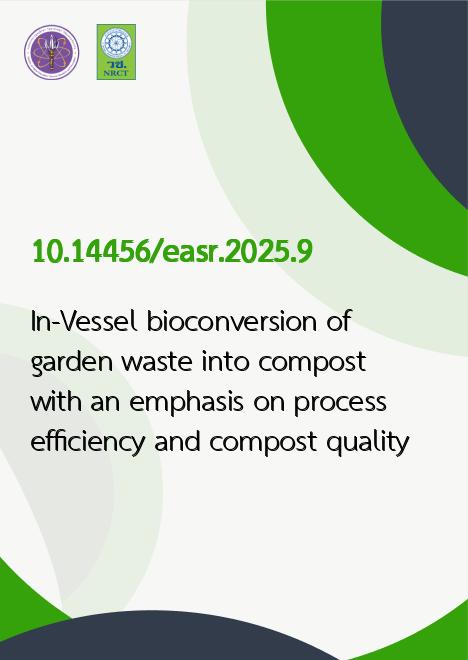
|
In-Vessel bioconversion of garden waste into compost with an emphasis on process efficiency and compost quality |
|---|---|
| รหัสดีโอไอ | |
| Creator | 1. Hrishikesh Shivam 2. Dayanand Sharma 3. Tushar Bansal 4. Ranjana Pande 5. Saurabh Kumar 6. Uruya Weesakul |
| Title | In-Vessel bioconversion of garden waste into compost with an emphasis on process efficiency and compost quality |
| Publisher | Faculty of Engineering, Khon Kaen University |
| Publication Year | 2568 |
| Journal Title | Engineering and Applied Science Research |
| Journal Vol. | 52 |
| Journal No. | 1 |
| Page no. | 105-111 |
| Keyword | Thermophilic temperature, Phytotoxicity, Garden waste, Shredder, Nutrients |
| URL Website | https://ph01.tci-thaijo.org/index.php/easr/index |
| Website title | Engineering and Applied Science Research |
| ISSN | 2539-6161 |
| Abstract | With the fast-growing urbanization efficient management of garden waste, whether at residential or social levels, has now become a challenge and an opportunity to enhance soil quality. Three different trials T1, T2, and T3 were executed constituting different forms of garden waste like un-shredded, shredded and shredded dry leaves with additives with varying processing conditions carried for 42 days using cylindrical In-vessel composters made up of HDPE. The composting process is scrutinized regularly at fixed intervals for all parameters like temperature, moisture, pH, electrical conductivity, germination index, C/N, micro & macronutrients etc. The temperature reached thermophilic in two trials T2 and T3. The pH reached the basic range of 8-8.5 in the final compost of all trials. The moisture was maintained up to 65% throughout the composting period. The trial 3 was the best combination among all the trials in which the variation of pH was (7.7-8.5), total organic carbon (42.2-35.6), total nitrogen (0.7-1.4), C: N ratio (60.3-25.4), cellulose (43.4-4.2), hemicellulose (10.2-0.9) and lignin (13.1-0.15) at the end of 42 days. The degradation rate of Un-shredded leaves was found to be very slow due large size of dry leaves. The findings highlighted that effective garden waste management is possible by following particular guidelines and it reduces the environmental impact of current disposal techniques and in addition, improves soil health using garden waste compost. |
